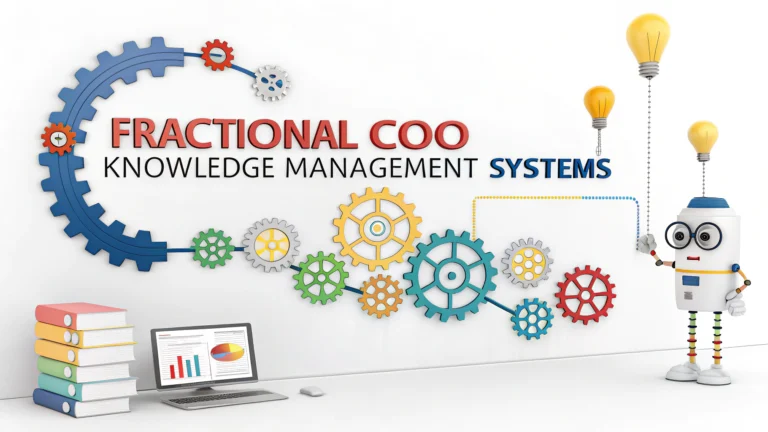Knowledge management systems play a central role in organizing and distributing critical information for fractional COOs and their teams.
These systems help streamline operations, reduce redundancy, and ensure consistent delivery of services across multiple client engagements.
For fractional COOs looking to implement effective knowledge management solutions, this guide outlines the essential components and best practices.
Key Components of Knowledge Management Systems
- Document repositories
- Process documentation tools
- Collaboration platforms
- Training materials
- Standard operating procedures (SOPs)
- Client-specific information databases
Recommended Knowledge Management Tools
| Tool Type | Recommended Options | Best For |
|---|---|---|
| Document Management | Google Workspace, Microsoft SharePoint | File storage and sharing |
| Process Documentation | Notion, Confluence | SOPs and workflows |
| Project Management | Asana, ClickUp | Task tracking and team coordination |
Setting Up Your Knowledge Base
Start with a clear organizational structure that separates internal processes from client-specific information.
Implement a standardized naming convention for all documents and folders.
Create templates for common documents and processes to ensure consistency.
Essential Documentation Categories
- Client Onboarding: Welcome packets, questionnaires, contracts
- Operations: Workflows, checklists, procedures
- Team Resources: Training materials, best practices
- Client Management: Communication protocols, reporting templates
- Technology: System access, software guides
Security and Access Control
Implement role-based access control to protect sensitive information.
Use two-factor authentication for all knowledge management platforms.
Regularly audit access permissions and update as needed.
Best Practices for Maintenance
- Schedule monthly reviews of documentation
- Assign documentation owners for each category
- Track document versions and updates
- Create backup systems for critical information
- Implement feedback loops for continuous improvement
Integration with Client Systems
Establish clear boundaries between internal and client-facing documentation.
Create client-specific portals when necessary.
Maintain separate repositories for each client while keeping standard processes accessible.
Training and Adoption
Develop a training program for team members on using the knowledge management system.
Create quick-reference guides for common tasks.
Set up regular check-ins to ensure proper system usage.
Moving Forward with Knowledge Management
Regular system audits and updates ensure your knowledge management system remains effective and relevant.
Consider scheduling a consultation with knowledge management experts like Atlassian Consulting or Microsoft Consulting Services for specialized guidance.
Remember that a well-maintained knowledge management system becomes more valuable over time as it grows with your fractional COO practice.
Measuring Knowledge Management Success
- Track system usage and adoption rates
- Monitor time saved in onboarding and operations
- Collect feedback from team members and clients
- Analyze documentation quality and completeness
- Measure response times to common queries
Scaling Your Knowledge Base
As your fractional COO practice grows, your knowledge management needs will evolve.
Growth Considerations
- Plan for increased storage capacity
- Implement advanced search functionality
- Develop multi-level access hierarchies
- Create department-specific subsections
- Build scalable template libraries
Automation and Integration
Leverage automation tools to streamline knowledge management workflows.
- Automatic document versioning
- Scheduled backup processes
- Integration with communication tools
- Automated notification systems
- Smart categorization features
Future-Proofing Your Knowledge System
Consider emerging technologies and changing business needs when planning system updates.
- AI-powered search and categorization
- Mobile accessibility improvements
- Cross-platform compatibility
- Enhanced security protocols
- Integration with emerging tools
Empowering Success Through Knowledge Excellence
A robust knowledge management system serves as the foundation for scalable fractional COO services.
Regular investment in your knowledge infrastructure ensures long-term operational success.
Focus on creating a living system that evolves with your practice and consistently delivers value to your clients and team members.
FAQs
- What is a Fractional COO Knowledge Management System?
A Fractional COO Knowledge Management System is a structured framework that helps part-time or shared Chief Operating Officers organize, store, and distribute critical operational information across an organization efficiently. - How does a Fractional COO integrate knowledge management into different organizations?
They implement customized systems that capture, organize, and share operational knowledge across multiple client organizations while maintaining clear boundaries and confidentiality between different clients. - What are the essential components of a Fractional COO’s knowledge management system?
The system typically includes standard operating procedures (SOPs), process documentation, workflow management tools, training materials, performance metrics tracking, and communication protocols. - What technology platforms are commonly used for Fractional COO knowledge management?
Common platforms include SharePoint, Notion, Confluence, Process Street, and specialized project management tools like Asana or Monday.com, combined with document management systems. - How do Fractional COOs ensure knowledge continuity across different client engagements?
They maintain detailed documentation, implement standardized processes, use cloud-based collaborative tools, and create transition plans that ensure operational knowledge remains accessible even after their engagement ends. - What security measures should be in place for a Fractional COO’s knowledge management system?
The system should include role-based access controls, data encryption, secure authentication protocols, regular backups, and compliance with relevant data protection regulations for each client. - How can a Fractional COO measure the effectiveness of their knowledge management system?
Key metrics include time saved in operations, reduced error rates, improved employee onboarding time, decreased dependency on key individuals, and increased operational efficiency across client organizations. - What are the best practices for maintaining and updating a Fractional COO’s knowledge base?
Regular audits of documentation, scheduled reviews of processes, feedback incorporation from users, version control implementation, and systematic updates based on operational changes and lessons learned. - How does a Fractional COO handle intellectual property in their knowledge management system?
They maintain clear segregation of proprietary information between clients, use non-disclosure agreements, and implement specific protocols for handling and protecting each organization’s intellectual property. - What role does change management play in a Fractional COO’s knowledge system?
Change management ensures smooth implementation of new processes, proper documentation of modifications, and effective communication of updates to all stakeholders while maintaining operational continuity.







